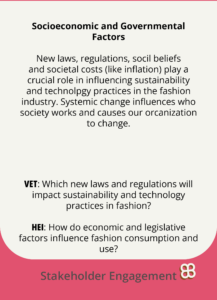Socioeconomic and Governmental Factors
Socioeconomic and governmental factors encompass laws, regulations, social beliefs, and economic conditions that impact the fashion industry, particularly in sustainability and technology. These factors drive systemic change, influencing how fashion brands operate, and shaping product design, production, and consumption as the industry adapts to shifting societal expectations and economic realities. New laws and regulations play a critical role in shaping the sustainability practices of fashion brands. Governments worldwide are increasingly implementing legislation aimed at reducing the environmental impact of the fashion industry, including regulations on carbon emissions, waste management, and hazardous materials. These laws push brands to adopt greener practices, invest in sustainable technologies, and enhance transparency across their supply chains. Compliance is not only a legal obligation but also a key component of corporate responsibility and brand reputation.
Societal beliefs and values significantly drive change within the fashion industry. As consumers become more aware of the environmental and social impacts of their purchasing decisions, there is a growing demand for ethically produced and sustainable fashion. This shift encourages brands to prioritize sustainability, embrace ethical labor practices, and develop products that align with socially conscious values. Brands that fail to adapt to these evolving beliefs risk losing market share and facing public backlash. Economic conditions, such as inflation, unemployment rates, and overall economic stability, directly affect fashion consumption patterns. During economic downturns, consumers may cut back on non-essential items, leading to decreased demand for fashion products. Conversely, periods of economic growth can lead to increased disposable income and higher consumption, often fueling the fast fashion industry. However, economic factors can also drive the adoption of sustainable practices as consumers seek durable, high-quality products that offer long-term value.
Governmental policies on trade, taxation, and labor also influence the fashion industry. Trade agreements can affect the cost of raw materials and finished goods, impacting pricing and profitability. Tax incentives for sustainable practices or penalties for environmental harm can encourage brands to adopt greener technologies and practices. Labor laws, particularly those regulating working conditions and wages, are crucial in ensuring that fashion production is both ethical and sustainable. Systemic change, driven by these socioeconomic and governmental factors, compels fashion brands to continually adapt and evolve. This evolution often requires significant investment in new technologies, the development of more sustainable business models, and the alignment of corporate strategies with societal and governmental expectations. Brands that proactively engage with these changes are better positioned to thrive in a dynamic global market, while those that resist may struggle to maintain relevance and consumer trust.
Case studies
Girlfriend Collective
Girlfriend Collective is a US-based activewear brand that uses recycled materials, such as plastic bottles, to create its products. The company emphasizes transparency, fair wages, and safe working conditions in its supply chain, collaborating with manufacturing partners who follow fair labor practices. They appeal to consumers seeking sustainable and ethically produced clothing. Find more information here.
Kowtow
Kowtow, based in New Zealand, is committed to fair trade and sustainable fashion. The brand sources organic cotton and ensures that workers in its supply chain are paid fair wages and work in safe conditions. Kowtow emphasizes slow fashion, aligning with the social responsibility of reducing overproduction and supporting ethical labor practices. Learn more about Kowtow here.
Tonlé
Tonlé is a zero-waste fashion brand based in Cambodia that focuses on sustainability and social responsibility. The brand employs local artisans and tailors, ensuring fair wages and dignified working conditions. By using scrap fabrics and adopting a circular business model, Tonlé reduces waste and creates fashion products that emphasize environmental and social equity. More about Tonlé can be found here.
References
- Amed, I., Balchandani, A., Beltrami, M., Berg, A., Hedrich, S., Jensen, J. E., … & Rölkens, F. (2021). The State of Fashion 2021: In search of promise in perilous times. McKinsey & Company
- Bick, R., Halsey, E., & Ekenga, C. C. (2018). The global environmental injustice of fast fashion. Environmental Health, 17, 92
- Brydges, T. (2021). Closing the loop on take, make, waste: Investigating circular economy practices in the Swedish fashion industry. Journal of Cleaner Production, 293, 126245
- Diddi, S., & Yan, R. N. (2019). Consumer perceptions related to clothing repair and reuse: Exploring the role of motivation, ability, and opportunity. Sustainable Production and Consumption, 18, 174-185
- European Commission. (n.d.). Ecodesign for sustainable products regulation (ESPR). European Commission
- Gazzola, P., Pavione, E., Pezzetti, R., & Grechi, D. (2020). Trends in the fashion industry. The perception of sustainability and circular economy: A gender/generation quantitative approach. Sustainability, 12(7), 2809
- Henninger, C. E., Alevizou, P. J., Goworek, H., & Ryding, D. (2021). Sustainable fashion: A global perspective. Springer
- Jung, S., & Jin, B. E. (2021). Sustainable development of slow fashion businesses: Customer value approach. Sustainability, 13(6), 3068
- Sandin, G., & Peters, G. M. (2018). Environmental impact of textile reuse and recycling – A review. Journal of Cleaner Production, 184, 353-365
- Shen, B., Li, Q., Dong, C., & Perry, P. (2022). Sustainability issues in textile and apparel supply chains: Chinese firms’ perspectives. Resources, Conservation and Recycling, 181, 106236
